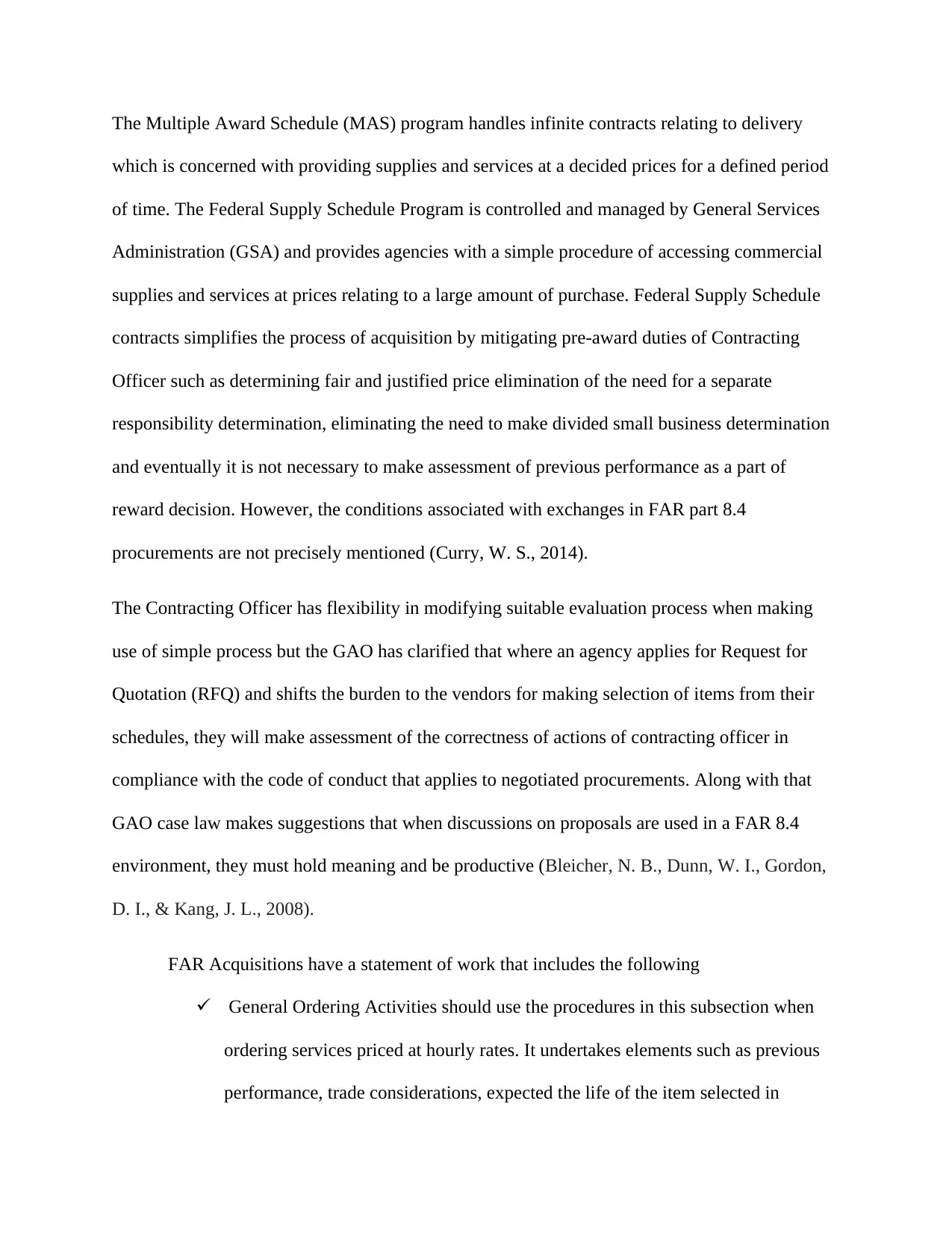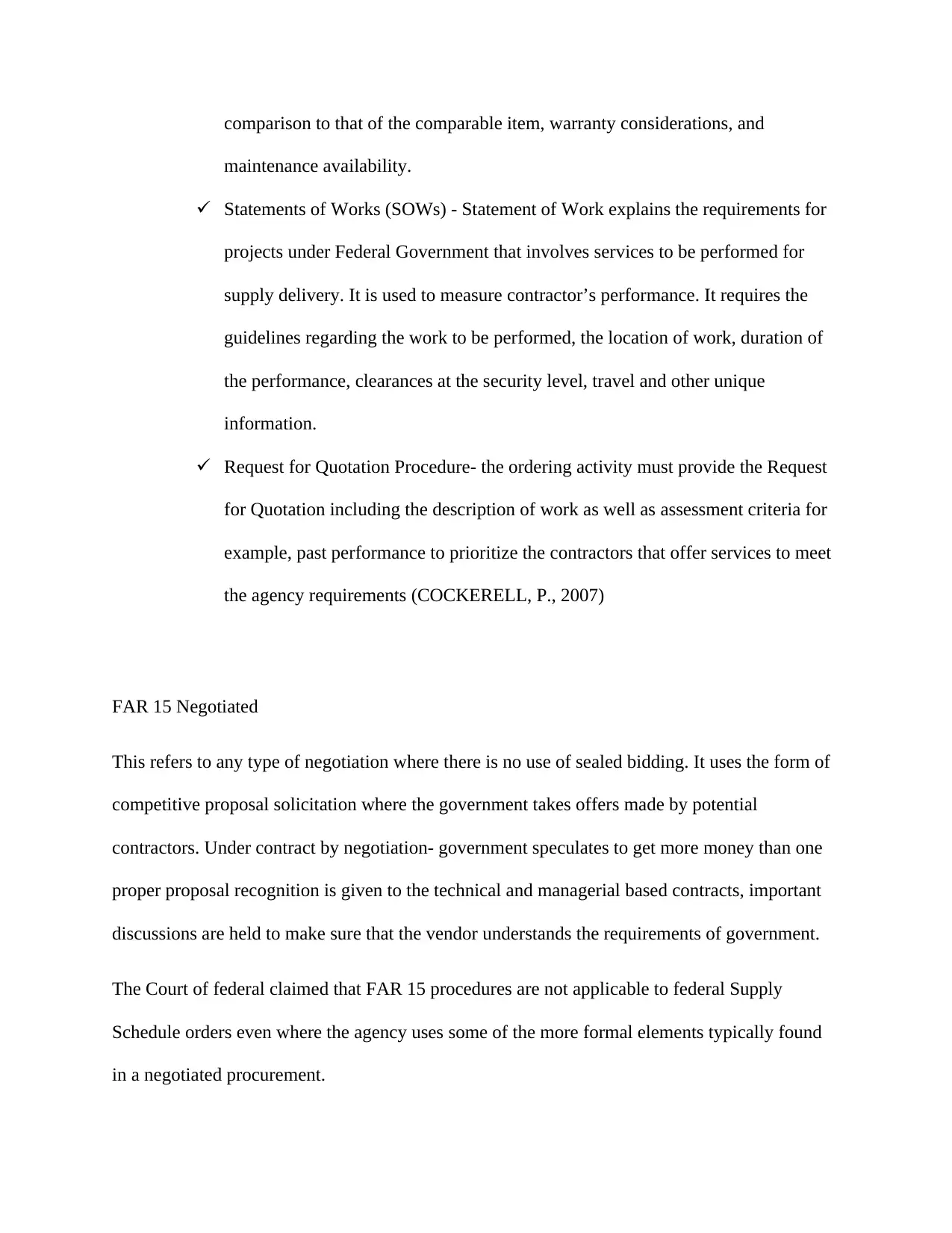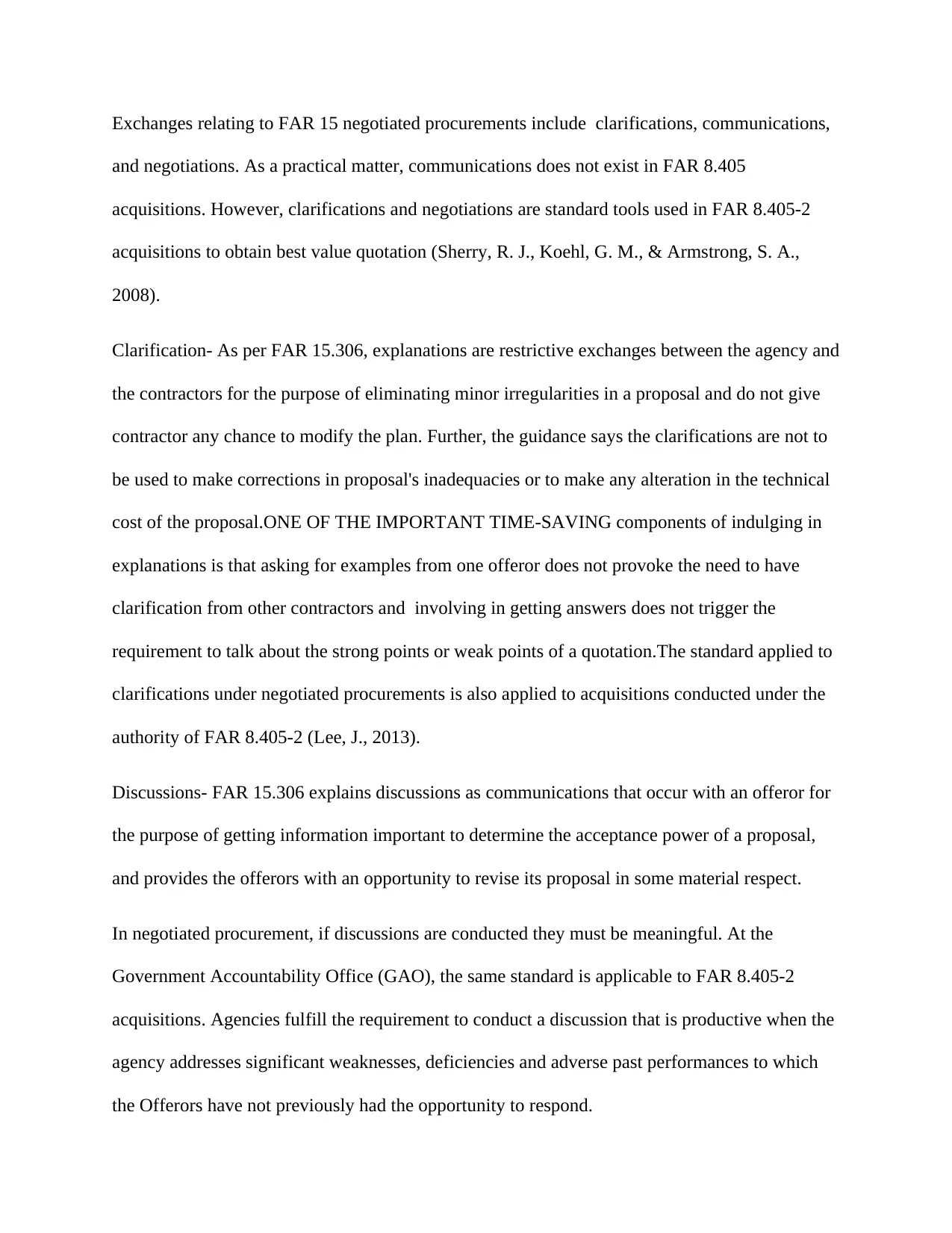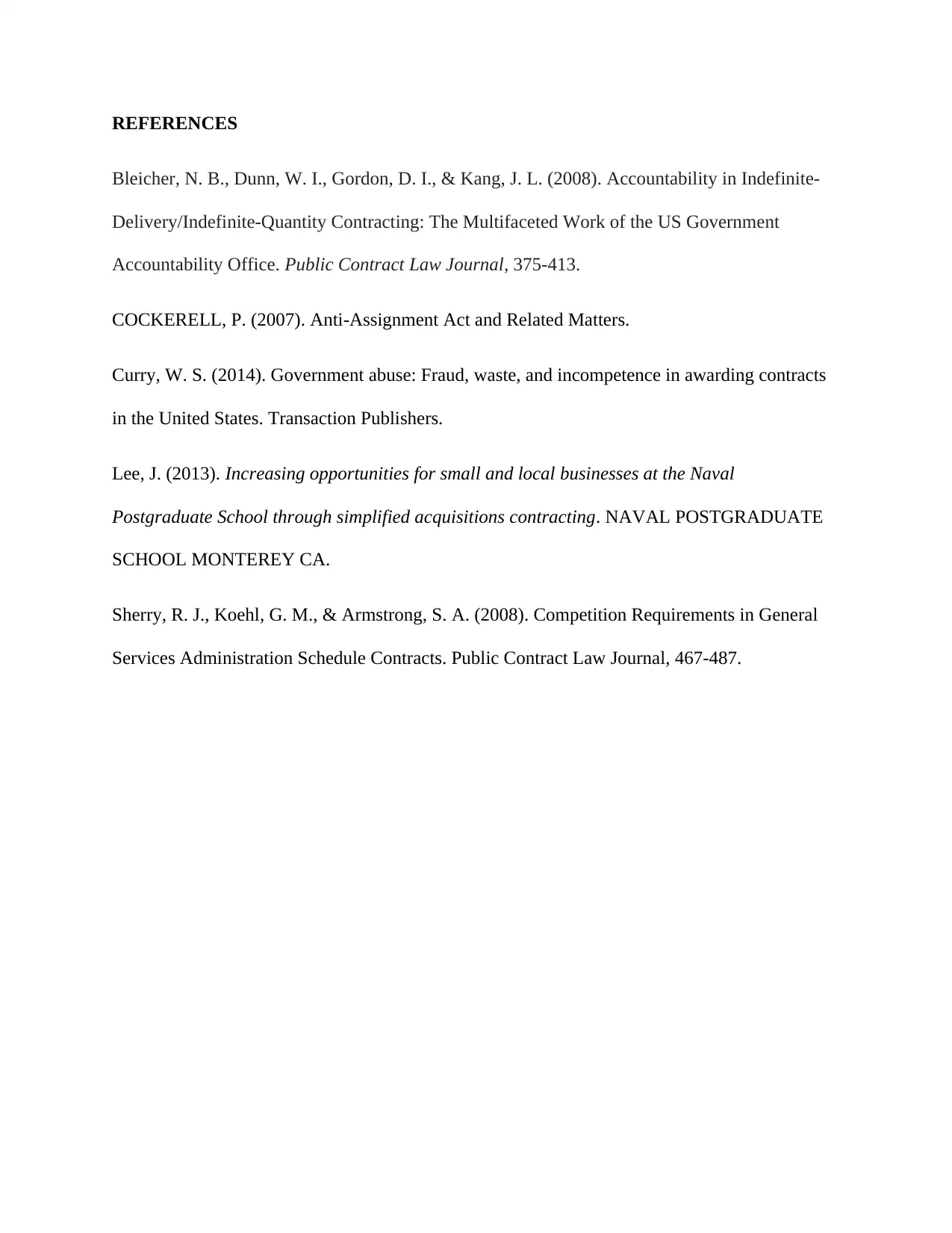Detailed Report: Contract Pricing Negotiation in MAS Program
VerifiedAdded on 2019/10/12
|5
|1062
|218
Report
AI Summary
This report provides a comprehensive analysis of contract pricing negotiation within the Multiple Award Schedule (MAS) program. It examines the role of the General Services Administration (GSA) and the Federal Supply Schedule Program in providing access to commercial supplies and services. The report delves into the procedures outlined in FAR part 8.4 procurements, including Request for Quotation processes and the importance of meaningful discussions. It also explores FAR 15 negotiated procurements, differentiating between clarifications and discussions, and emphasizes the standard applied to clarifications and discussions under FAR 8.405-2 acquisitions. The report references key elements such as Statements of Work (SOWs), and the importance of understanding these elements in government contracts. The analysis includes relevant case law and guidelines, offering a detailed understanding of the negotiation processes and requirements within federal contracting.

Contract Pricing Negotiation
Paraphrase This Document
Need a fresh take? Get an instant paraphrase of this document with our AI Paraphraser

The Multiple Award Schedule (MAS) program handles infinite contracts relating to delivery
which is concerned with providing supplies and services at a decided prices for a defined period
of time. The Federal Supply Schedule Program is controlled and managed by General Services
Administration (GSA) and provides agencies with a simple procedure of accessing commercial
supplies and services at prices relating to a large amount of purchase. Federal Supply Schedule
contracts simplifies the process of acquisition by mitigating pre-award duties of Contracting
Officer such as determining fair and justified price elimination of the need for a separate
responsibility determination, eliminating the need to make divided small business determination
and eventually it is not necessary to make assessment of previous performance as a part of
reward decision. However, the conditions associated with exchanges in FAR part 8.4
procurements are not precisely mentioned (Curry, W. S., 2014).
The Contracting Officer has flexibility in modifying suitable evaluation process when making
use of simple process but the GAO has clarified that where an agency applies for Request for
Quotation (RFQ) and shifts the burden to the vendors for making selection of items from their
schedules, they will make assessment of the correctness of actions of contracting officer in
compliance with the code of conduct that applies to negotiated procurements. Along with that
GAO case law makes suggestions that when discussions on proposals are used in a FAR 8.4
environment, they must hold meaning and be productive (Bleicher, N. B., Dunn, W. I., Gordon,
D. I., & Kang, J. L., 2008).
FAR Acquisitions have a statement of work that includes the following
General Ordering Activities should use the procedures in this subsection when
ordering services priced at hourly rates. It undertakes elements such as previous
performance, trade considerations, expected the life of the item selected in
which is concerned with providing supplies and services at a decided prices for a defined period
of time. The Federal Supply Schedule Program is controlled and managed by General Services
Administration (GSA) and provides agencies with a simple procedure of accessing commercial
supplies and services at prices relating to a large amount of purchase. Federal Supply Schedule
contracts simplifies the process of acquisition by mitigating pre-award duties of Contracting
Officer such as determining fair and justified price elimination of the need for a separate
responsibility determination, eliminating the need to make divided small business determination
and eventually it is not necessary to make assessment of previous performance as a part of
reward decision. However, the conditions associated with exchanges in FAR part 8.4
procurements are not precisely mentioned (Curry, W. S., 2014).
The Contracting Officer has flexibility in modifying suitable evaluation process when making
use of simple process but the GAO has clarified that where an agency applies for Request for
Quotation (RFQ) and shifts the burden to the vendors for making selection of items from their
schedules, they will make assessment of the correctness of actions of contracting officer in
compliance with the code of conduct that applies to negotiated procurements. Along with that
GAO case law makes suggestions that when discussions on proposals are used in a FAR 8.4
environment, they must hold meaning and be productive (Bleicher, N. B., Dunn, W. I., Gordon,
D. I., & Kang, J. L., 2008).
FAR Acquisitions have a statement of work that includes the following
General Ordering Activities should use the procedures in this subsection when
ordering services priced at hourly rates. It undertakes elements such as previous
performance, trade considerations, expected the life of the item selected in

comparison to that of the comparable item, warranty considerations, and
maintenance availability.
Statements of Works (SOWs) - Statement of Work explains the requirements for
projects under Federal Government that involves services to be performed for
supply delivery. It is used to measure contractor’s performance. It requires the
guidelines regarding the work to be performed, the location of work, duration of
the performance, clearances at the security level, travel and other unique
information.
Request for Quotation Procedure- the ordering activity must provide the Request
for Quotation including the description of work as well as assessment criteria for
example, past performance to prioritize the contractors that offer services to meet
the agency requirements (COCKERELL, P., 2007)
FAR 15 Negotiated
This refers to any type of negotiation where there is no use of sealed bidding. It uses the form of
competitive proposal solicitation where the government takes offers made by potential
contractors. Under contract by negotiation- government speculates to get more money than one
proper proposal recognition is given to the technical and managerial based contracts, important
discussions are held to make sure that the vendor understands the requirements of government.
The Court of federal claimed that FAR 15 procedures are not applicable to federal Supply
Schedule orders even where the agency uses some of the more formal elements typically found
in a negotiated procurement.
maintenance availability.
Statements of Works (SOWs) - Statement of Work explains the requirements for
projects under Federal Government that involves services to be performed for
supply delivery. It is used to measure contractor’s performance. It requires the
guidelines regarding the work to be performed, the location of work, duration of
the performance, clearances at the security level, travel and other unique
information.
Request for Quotation Procedure- the ordering activity must provide the Request
for Quotation including the description of work as well as assessment criteria for
example, past performance to prioritize the contractors that offer services to meet
the agency requirements (COCKERELL, P., 2007)
FAR 15 Negotiated
This refers to any type of negotiation where there is no use of sealed bidding. It uses the form of
competitive proposal solicitation where the government takes offers made by potential
contractors. Under contract by negotiation- government speculates to get more money than one
proper proposal recognition is given to the technical and managerial based contracts, important
discussions are held to make sure that the vendor understands the requirements of government.
The Court of federal claimed that FAR 15 procedures are not applicable to federal Supply
Schedule orders even where the agency uses some of the more formal elements typically found
in a negotiated procurement.
⊘ This is a preview!⊘
Do you want full access?
Subscribe today to unlock all pages.

Trusted by 1+ million students worldwide

Exchanges relating to FAR 15 negotiated procurements include clarifications, communications,
and negotiations. As a practical matter, communications does not exist in FAR 8.405
acquisitions. However, clarifications and negotiations are standard tools used in FAR 8.405-2
acquisitions to obtain best value quotation (Sherry, R. J., Koehl, G. M., & Armstrong, S. A.,
2008).
Clarification- As per FAR 15.306, explanations are restrictive exchanges between the agency and
the contractors for the purpose of eliminating minor irregularities in a proposal and do not give
contractor any chance to modify the plan. Further, the guidance says the clarifications are not to
be used to make corrections in proposal's inadequacies or to make any alteration in the technical
cost of the proposal.ONE OF THE IMPORTANT TIME-SAVING components of indulging in
explanations is that asking for examples from one offeror does not provoke the need to have
clarification from other contractors and involving in getting answers does not trigger the
requirement to talk about the strong points or weak points of a quotation.The standard applied to
clarifications under negotiated procurements is also applied to acquisitions conducted under the
authority of FAR 8.405-2 (Lee, J., 2013).
Discussions- FAR 15.306 explains discussions as communications that occur with an offeror for
the purpose of getting information important to determine the acceptance power of a proposal,
and provides the offerors with an opportunity to revise its proposal in some material respect.
In negotiated procurement, if discussions are conducted they must be meaningful. At the
Government Accountability Office (GAO), the same standard is applicable to FAR 8.405-2
acquisitions. Agencies fulfill the requirement to conduct a discussion that is productive when the
agency addresses significant weaknesses, deficiencies and adverse past performances to which
the Offerors have not previously had the opportunity to respond.
and negotiations. As a practical matter, communications does not exist in FAR 8.405
acquisitions. However, clarifications and negotiations are standard tools used in FAR 8.405-2
acquisitions to obtain best value quotation (Sherry, R. J., Koehl, G. M., & Armstrong, S. A.,
2008).
Clarification- As per FAR 15.306, explanations are restrictive exchanges between the agency and
the contractors for the purpose of eliminating minor irregularities in a proposal and do not give
contractor any chance to modify the plan. Further, the guidance says the clarifications are not to
be used to make corrections in proposal's inadequacies or to make any alteration in the technical
cost of the proposal.ONE OF THE IMPORTANT TIME-SAVING components of indulging in
explanations is that asking for examples from one offeror does not provoke the need to have
clarification from other contractors and involving in getting answers does not trigger the
requirement to talk about the strong points or weak points of a quotation.The standard applied to
clarifications under negotiated procurements is also applied to acquisitions conducted under the
authority of FAR 8.405-2 (Lee, J., 2013).
Discussions- FAR 15.306 explains discussions as communications that occur with an offeror for
the purpose of getting information important to determine the acceptance power of a proposal,
and provides the offerors with an opportunity to revise its proposal in some material respect.
In negotiated procurement, if discussions are conducted they must be meaningful. At the
Government Accountability Office (GAO), the same standard is applicable to FAR 8.405-2
acquisitions. Agencies fulfill the requirement to conduct a discussion that is productive when the
agency addresses significant weaknesses, deficiencies and adverse past performances to which
the Offerors have not previously had the opportunity to respond.
Paraphrase This Document
Need a fresh take? Get an instant paraphrase of this document with our AI Paraphraser

REFERENCES
Bleicher, N. B., Dunn, W. I., Gordon, D. I., & Kang, J. L. (2008). Accountability in Indefinite-
Delivery/Indefinite-Quantity Contracting: The Multifaceted Work of the US Government
Accountability Office. Public Contract Law Journal, 375-413.
COCKERELL, P. (2007). Anti-Assignment Act and Related Matters.
Curry, W. S. (2014). Government abuse: Fraud, waste, and incompetence in awarding contracts
in the United States. Transaction Publishers.
Lee, J. (2013). Increasing opportunities for small and local businesses at the Naval
Postgraduate School through simplified acquisitions contracting. NAVAL POSTGRADUATE
SCHOOL MONTEREY CA.
Sherry, R. J., Koehl, G. M., & Armstrong, S. A. (2008). Competition Requirements in General
Services Administration Schedule Contracts. Public Contract Law Journal, 467-487.
Bleicher, N. B., Dunn, W. I., Gordon, D. I., & Kang, J. L. (2008). Accountability in Indefinite-
Delivery/Indefinite-Quantity Contracting: The Multifaceted Work of the US Government
Accountability Office. Public Contract Law Journal, 375-413.
COCKERELL, P. (2007). Anti-Assignment Act and Related Matters.
Curry, W. S. (2014). Government abuse: Fraud, waste, and incompetence in awarding contracts
in the United States. Transaction Publishers.
Lee, J. (2013). Increasing opportunities for small and local businesses at the Naval
Postgraduate School through simplified acquisitions contracting. NAVAL POSTGRADUATE
SCHOOL MONTEREY CA.
Sherry, R. J., Koehl, G. M., & Armstrong, S. A. (2008). Competition Requirements in General
Services Administration Schedule Contracts. Public Contract Law Journal, 467-487.
1 out of 5
Related Documents
Your All-in-One AI-Powered Toolkit for Academic Success.
+13062052269
info@desklib.com
Available 24*7 on WhatsApp / Email
![[object Object]](/_next/static/media/star-bottom.7253800d.svg)
Unlock your academic potential
Copyright © 2020–2025 A2Z Services. All Rights Reserved. Developed and managed by ZUCOL.





